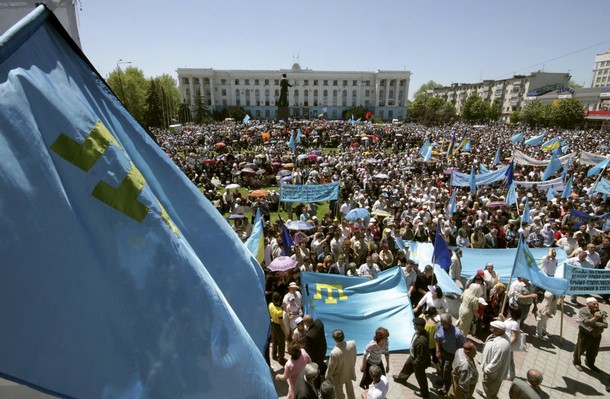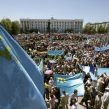
Crimean Tatars Divide Ukraine and Russia
Publication: Eurasia Daily Monitor Volume: 6 Issue: 121
By:

President Viktor Yushchenko has strongly condemned the 1944 deportation of Crimean Tatars on many occasions and ordered the Security Service (SBU) to open a special investigative unit examining crimes against humanity committed by the Soviet regime against them. Since the 1998 Ukrainian parliamentary elections, Rukh and President Yushchenko’s Our Ukraine have included Tatar leaders within their party lists.
The SBU unit will investigate the 1944 deportation and the earlier persecution of the Crimean Tatar intelligentsia. The SBU has declassified 63 criminal cases against Crimean Tatar members of the Milly Firqa separatist organization that operated from 1918-1928. SBU chairman Valentyn Nalyvaychenko recently outlined how the special unit would investigate who was responsible for the deportations. Crimean Tatars seek to have all former KGB documents pertaining to them declassified and made available for public scrutiny on the internet. The SBU promised the declassified documents would be given to families who suffered during the repressions.
On the 65th anniversary of the deportation of Crimean Tatars, Prime Minister Yulia Tymoshenko condemned it in no uncertain terms: "This terrible and severe page in our history we, as Ukrainians who ourselves went through the famine-genocide and repression, and for a long period of time defended their right to independence, feel the sufferings and consequences of each and every Crimean Tatar" (www.kmu.gov.ua May 18).
The anniversary coincided with the first World Congress of Crimean Tatars attended by 800 delegates from 11 countries. The congress, held in the famous Bakhchysaray palace, the former seat of the Tatar Khanate, was followed by a procession to the historical Zincirli Madrasah. The congress released the pent up frustrations felt by Crimean Tatars who are dissatisfied with the manner in which they have been treated by successive Ukrainian governments. Throughout much of May the Crimean Tatar protestors stood outside the cabinet of ministers’ office in Kyiv demanding greater attention for their economic and social plight.
Crimean Tatar leader Mustafa Dzhemilev, a veteran Soviet dissident, complained that no legislation has ever been adopted in Ukraine to reinstate the social and legal rights of his people (Voice of America Russian service, May 18). The World Congress called upon the Ukrainian president and prime minister, "to take urgent steps to deliver on all the previously reached agreements, and your instructions and promises regarding the fair resolution of land disputes in Crimea and providing Crimean Tatars with land" (UNIAN, May 23).
All of the infrastructure of the Crimean Tatars up to their 1944 deportation – theaters, schools, mosques, and other buildings – were expropriated by the Soviet regime and have not been returned. Crimean Tatar place names were subsequently Russified. Currently 15 out of 650 Crimean schools provide instruction in Crimean Tatar, but only 13 of these do so in the first three grades.
Land is the major source of dispute, as many Tatars live illegally as squatters, pushed into rural areas by developers taking prize urban real estate. High unemployment forces many Crimean Tatars to eke out a living within the shadow economy, as shuttle-traders where they regularly face violence from organized criminal gangs who control the street markets. The issue of the plight of the Crimean Tatars is seen in diametrically opposite ways by Ukrainians and Russians. Russian nationalist and communist parties and NGO’s in the Crimea hold to the Russian world view of Tatars as rabidly anti-Russian and "Nazi collaborators." They, and the Russian authorities, see Tsarina Catherine as a great builder of the Russian empire. Ukrainians and Tatars see her as a destroyer of their autonomy and independence in the last two decades of the eighteenth century. Following the Russian occupation of the Crimea, between the 1780’s to 1914 hundreds of thousands of Tatars emigrated to Ottoman Turkey, where in modern Turkey they remain a vocal lobby.
The charge of "Nazi collaborators" was first raised in May 1944 when the Soviet leader Joseph Stalin ordered the deportation of 200,000 Crimean Tatars to Uzbekistan. Between 25 percent (Soviet government figure) and 46 percent (Crimean Tatar estimate) died in the first year in exile. Smaller numbers of Germans, Armenians and Bulgarians were also deported. The place of these four ethnic groups was largely filled by ethnic Russians. The autonomous status of the Crimea within the Russian SFSR was abolished in 1944 and only revived in 1991 in the Ukrainian SSR to which the Crimea was transferred in 1954.
The USSR unleashed ideological tirades against Ukrainian, Baltic and Crimean Tatar nationalist diasporas by equating "nazi collaborationism" with "(separatist) bourgeois nationalism." This linkage escaped the anti-communist Russian diaspora as it, like the majority of Russian dissidents, never supported the secession of the Russian SFSR from the USSR. Russian nationalists and the majority of Russian democratic dissidents either supported the transformation of the USSR into a "Russian (or eastern Slavic) state" or the USSR’s democratization, not its dissolution. In 1967 the Soviet government dropped all charges of "Nazi collaboration." But, Tatars only began to return to the Crimea in the late 1980’s, where they now number 300,000 (12 percent of the population). The ethnic Russian majority is in decline from 65 (1989) to 58 (2001) percent. Approximately 100,000 Crimean Tatars continue to live in Uzbekistan.
Under Vladimir Putin the positive steps taken in the Gorbachev and Yeltsin eras in overcoming Soviet stereotypes and false criminal charges have been reversed. President Dmitry Medvedev’s creation of a "historical commission" coincides with a bill "opposing the rehabilitation of Nazism, Nazi criminals and their accomplices" in the former USSR. The "falsification of history" is better applied to Russian leaders who have ordered school textbooks to portray Stalin as an "effective manager," and his mass crimes against humanity explained away as the only manner in which to overcome the USSR’s economic and security challenges. However, as the Moscow-based political analyst Yevgeny Kiselyov, recently observed: "The worst ‘falsifier’ of history, of course, has been the Kremlin" (Moscow Times, June 3). Stalin came in third place in the "Name of Russia" nationwide television contest held in November 2008.
Ukraine’s strategy of declassifying KGB documents pertaining to Soviet crimes against humanity began in the 1990’s, and was speeded up under Yushchenko. The policy is diametrically at odds with Russia under Putin, which continues to block access to archives. Soviet documents on the 1933 Ukrainian famine and other Soviet crimes are being declassified in Ukraine, while they remain a "state secret" in Russia (Moscow Times, June 9).




